Meet the people behind our centre, discover their areas of expertise, interests, and recommendations.
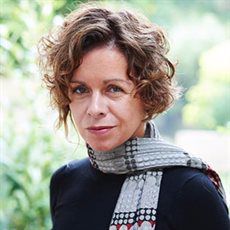
Professor Lyndsey Stonebridge is an Interdisciplinary Chair and Professor of Humanities and Human Rights at the University of Birmingham. Her work focuses on twentieth-century and contemporary literature, political theory, and history, Human Rights, and Refugee Studies, drawing on the interdisciplinary connections between literature, history, politics, law, and social policy. The work of the twentieth-century political theorist, Hannah Arendt, is central to Professor Stonebridge’s understanding of modern history, violence, statelessness, and judgement. She is currently writing a critical-creative account of the relevance Arendt’s thinking for today, Thinking Like Hannah Arendt, which will be published by Jonathan Cape in 2023.
Could you tell us a bit about your current research…
Lyndsey Stonebridge: My current project is critical-creative book on the political philosopher Hannah Arendt. This is a new departure for me because it’s a trade book, which is very different world and a very different kind of writing, so it’s presented lots of interesting and exciting challenges on the way. It’s also a book that faces inside and outside the Academy. It is going to be published by Jonathan Cape in the UK, Hogarth in the US and Verlag Beck in Germany. That’ll be hopefully next year and then I can follow through with some more theoretical close reading academic papers.
Do you miss doing the academic papers?
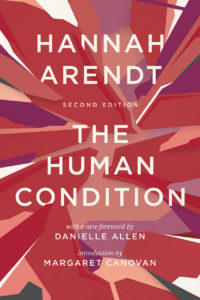 LS: Well, in some ways, I still do that because I think as academics, as literature academics, we’re trained to do close reading and put arguments together, so what I tend to do. What has been time-consuming is to do the close reading that and then, undo and then tell a story about the material. Scientists have their laboratories and humanists have our close reading and archives. The challenge is to tell a good story out of dense and complicated findings. I’ve been doing this for years and I can tell you it’s much harder to tell a story to a wider audience than to offer readings to other specialists. We should really be teaching everyone to tell stories, as well as teaching everyone to do close reading.
LS: Well, in some ways, I still do that because I think as academics, as literature academics, we’re trained to do close reading and put arguments together, so what I tend to do. What has been time-consuming is to do the close reading that and then, undo and then tell a story about the material. Scientists have their laboratories and humanists have our close reading and archives. The challenge is to tell a good story out of dense and complicated findings. I’ve been doing this for years and I can tell you it’s much harder to tell a story to a wider audience than to offer readings to other specialists. We should really be teaching everyone to tell stories, as well as teaching everyone to do close reading.
And it’s a fun thing to do as well!
LS: Yeah and you wouldn’t let a chemist in a laboratory who didn’t know what they were doing with really toxic chemicals needed, and you don’t let a humanities scholar who can’t work an archive or read well out either. Writing for a wide audience is much more like teaching because you’re always thinking how can I tell this story. How can I tell this story in a way that’s valuable and interesting? How can I tell the story to people who haven’t been doing close reading all their lives or are immersed in mid 20th century modernism and critical theory? How do I tell that story to those people? So those are those kind of challenges I’ve been facing.
Does it have a title?
LS: It has a subtitle. I think it will be called Thinking Like Hannah Arendt. But the developed title might be What We Are Doing, because very famously in the beginning of her 1958 book The Human Condition, she says, all I ask that we do is simply to think what we are doing. So there is a kind of Hannah Arendt-for-now element.
How have you been adjusting to in-person teaching/being on campus once again?
 LS: I haven’t because I have to write this book. I was fortunate enough to get a Leverhulme major research fellowship. So the very time I would have been coming back onto campus I’ve actually been doing self-imposed lockdown and I’ve either been in archives or writing.
LS: I haven’t because I have to write this book. I was fortunate enough to get a Leverhulme major research fellowship. So the very time I would have been coming back onto campus I’ve actually been doing self-imposed lockdown and I’ve either been in archives or writing.
Do you miss being on campus?
Yes, I do, yes, of course, I do, I’m looking forward to getting back in 2023. I think in-person teaching is core to the humanities. It goes back to the question about close reading and our practice, we can only really do it together.
In the wider field of contemporary literature and culture research, what are your current obsessions (the areas that interest you the most and you find the most exciting)?
LS: Well, I think it is about finding ways of writing and thinking that connect with reality. My two most recent books try to do this. The first was called Placeless People, and that was trying to track the evolution of writing about refugees in the mid 20th century and I wrote that against the background of Brexit. Then I did a very a small book written out of my experience teaching students and aimed at students, Writing and Righting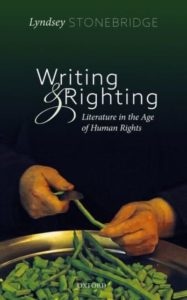 . I’m an interdisciplinary Professor, and I was interested in that book in showing the vital and very lived connections between forms of imagination and writing and questions of social and political justice. I think it is that engagement that interests me most.
. I’m an interdisciplinary Professor, and I was interested in that book in showing the vital and very lived connections between forms of imagination and writing and questions of social and political justice. I think it is that engagement that interests me most.
What are three contemporary texts you read/watched/experienced recently that have had a big impact on you?
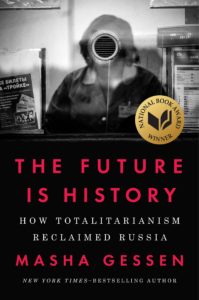 LS: Reading the archive of Hannah Arendt has certainly had a big, big impact on me, over the last eighteen months, because that’s pretty much all I’ve been reading! I’ve been reading a lot more nonfiction recently and I think that is a response, as it indeed it was for writers in the mid 20th century, which is my specialist area, to the strange reality of the world that requires a kind of fictional imagination in order to comprehend it. The last book that had a big impact on me, which I couldn’t put down was, Masha Gessen’s book on the post perestroika history of the Soviet Union called The Future is History: How Totalitarianism Reclaimed Russia. Gessen is a journalist and they write so well. The story is told through vignettes of people who lived through perestroika, and it shows, with a pinpoint devastating accuracy, how totalitarian elements re-emerged in Russian culture. If you ever wanted to be persuaded that anti-feminism and homophobia are the hallmarks of contemporary fascism, this is the book you need to read.
LS: Reading the archive of Hannah Arendt has certainly had a big, big impact on me, over the last eighteen months, because that’s pretty much all I’ve been reading! I’ve been reading a lot more nonfiction recently and I think that is a response, as it indeed it was for writers in the mid 20th century, which is my specialist area, to the strange reality of the world that requires a kind of fictional imagination in order to comprehend it. The last book that had a big impact on me, which I couldn’t put down was, Masha Gessen’s book on the post perestroika history of the Soviet Union called The Future is History: How Totalitarianism Reclaimed Russia. Gessen is a journalist and they write so well. The story is told through vignettes of people who lived through perestroika, and it shows, with a pinpoint devastating accuracy, how totalitarian elements re-emerged in Russian culture. If you ever wanted to be persuaded that anti-feminism and homophobia are the hallmarks of contemporary fascism, this is the book you need to read.
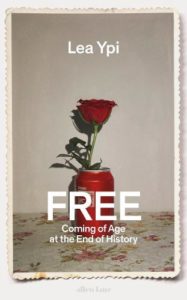 The other book I think that is extraordinary, which actually last night, won the Royal Society of Literature Prize, Lea Ypi’s Free, which is an account of Ypi’s upbringing in Albania and was my book of the year for the New Statesman. All these books are written by really smart people who understand history of politics, but they are written with such clarity and emotional and historical precision, they also count as works of art, so this creative nonfiction genre is emerging. It’s no accident, I think, that some of the best writers this genre are women or non-binary as in Masha’s case. So Hannah Arendt, Masha Gessen and Lea Ypi, these are the people that I’ve been carrying around in my head. I’m a Professor of Humanities and Human Rights and before I came to the University of Birmingham, I worked in both a history department and a literature department at the University of East Anglia. I’ve always been fascinated by the interface between the between imagination and reality.
The other book I think that is extraordinary, which actually last night, won the Royal Society of Literature Prize, Lea Ypi’s Free, which is an account of Ypi’s upbringing in Albania and was my book of the year for the New Statesman. All these books are written by really smart people who understand history of politics, but they are written with such clarity and emotional and historical precision, they also count as works of art, so this creative nonfiction genre is emerging. It’s no accident, I think, that some of the best writers this genre are women or non-binary as in Masha’s case. So Hannah Arendt, Masha Gessen and Lea Ypi, these are the people that I’ve been carrying around in my head. I’m a Professor of Humanities and Human Rights and before I came to the University of Birmingham, I worked in both a history department and a literature department at the University of East Anglia. I’ve always been fascinated by the interface between the between imagination and reality.
If you could only recommend one academic text to a novice in your field, what would it be?
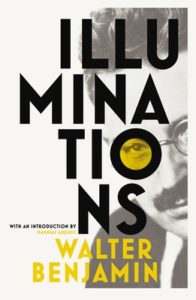 LS: Probably something like Walter Benjamin’s Illuminations. Not Adorno, not particularly Arendt in this case. But for a sense of the kind of imagination you need to be able to grasp a complex historical reality, and also a sense of permission to get lost in that complexity. Ours is a discipline that affirms getting lost, not just to stay lost, that would be indulgent, but to represent how complex the world actually is.
LS: Probably something like Walter Benjamin’s Illuminations. Not Adorno, not particularly Arendt in this case. But for a sense of the kind of imagination you need to be able to grasp a complex historical reality, and also a sense of permission to get lost in that complexity. Ours is a discipline that affirms getting lost, not just to stay lost, that would be indulgent, but to represent how complex the world actually is.
Do you have anything exciting coming up?
LS: My first academic appearances, going back into the public world, are just coming up. I’m talking have a short conference on ‘Freedom’, which is great. I love the fact that my first conference since Covid is going to be on freedom. Then I’m giving a lecture in Durham and i’m giving the Law lecture at Queen Mary’s. I’ll be taking my new work on Arendt out in those events so that is quite exciting as well as nerve-wracking.
Are there any activities (volunteering, work, side-projects, collaborations) which are important to your research and approach? What do you find most supportive/heart-warming at the moment?
LS: Well, I’ve been writing a book which has been a solitary process, but the collaborative works I’ve done before, such as Refugee Hosts, which is an interdisciplinary project working with Palestinian and Syrian people, I learned an awful lot from. The University of Birmingham network that I was involved with getting the grant for (I was PI on but then I had to sit down to write the Arendt book), Rights4Time, is enormously exciting because it brings together psychologists, neurobiologists, lawyers, storytellers and humanities people to stretch out the idea of human rights across time. Those two networks are very, very important to me. The friends you make when you start out as a writer can often be the friends for life. These are the people who you shared drafts with, the people you cry on the phone with say I’ll never finish this book, I’m a complete failure (and don’t let anyone tell you people stop doing that soon as they become a senior Professor, they don’t!). So I do think those of us who are relatively new to academic, and I mean in terms of class, race, and gender, have one priceless advantage of those who have been there forever and are now sitting in lonely entitlement, which is that they know they could not have done it without one another – without friendship and solidarity.
